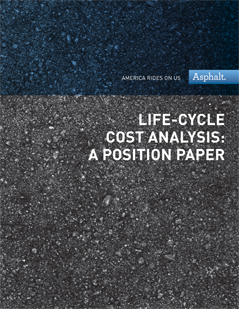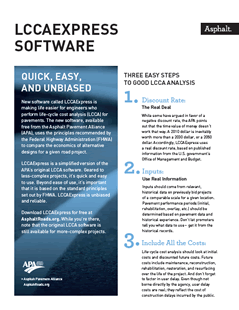 A new position paper from the Asphalt Pavement Alliance (APA) articulates an appropriate and non-biased method for life-cycle cost analysis (LCCA) that follows guidelines from the Federal Highway Administration. The new APA document covers all the most important concepts, such as net present value, discount rates, salvage value, maintenance costs, and predicted performance life.
A new position paper from the Asphalt Pavement Alliance (APA) articulates an appropriate and non-biased method for life-cycle cost analysis (LCCA) that follows guidelines from the Federal Highway Administration. The new APA document covers all the most important concepts, such as net present value, discount rates, salvage value, maintenance costs, and predicted performance life.
Download the new document here.
Software from the APA is making life easier for engineers who perform life-cycle cost analysi s (LCCA) for pavements. The software, available free from the Asphalt Pavement Alliance (APA), uses the principles recommended by the Federal Highway Administration (FHWA) to compare the economics of alternative designs for a given road project.
s (LCCA) for pavements. The software, available free from the Asphalt Pavement Alliance (APA), uses the principles recommended by the Federal Highway Administration (FHWA) to compare the economics of alternative designs for a given road project.
Four Easy Steps to Good LCCA Analysis
1. Discount Rate – The Real Deal
While some have argued in favor of a negative discount rate, the time value of money doesn’t work that way. A 2010 dollar is inevitably worth more than a 2030 dollar, or a 2050 dollar. Accordingly, LCCAExpress uses a real discount rate, based on published information from the U.S. government’s Office of Management and Budget.
2. Inputs – Use Real Information
Inputs should come from relevant, historical data on previously bid projects of a comparable scale for a given location. Pavement performance periods (initial, rehabilitation, overlay, etc) should be determined based on pavement data and historical experience. Don’t let promoters tell you what data to use – get it from the historical records.
3. Include All the Costs
Life-cycle cost analysis should look initial costs and discounted future costs. Future costs include maintenance, reconstruction, rehabilitation, restoration, and resurfacing over the life of the project. And don’t forget to factor in user delay. Even though not borne directly by the agency, user delay costs are real; they reflect the cost of construction delays incurred by the public.
4. Use the APA’s Software
The APA’s software comes in two versions: LCCA Original and LCCAExpress. Both use the principles recommended by FHWA. Both are unbiased and reliable.
LCCA Original calculates the net present value of different pavement alternatives using either deterministic or probabilistic analyses as described in FHWA Publication No. FHWA-SA-98-079, Life-Cycle Cost Analysis in Pavement Design.
Among the powerful features of the software are
- The ability to include or exclude user delay costs from the complete analysis or any single work activity.
- Maximum AADT value, important for projects analyzed over long periods or with high traffic growth.
LCCAExpress is a simplified version of LCCA Original. Geared to less-complex projects, it’s quick and easy to use.
Download LCCA Original 3.1 now
The APA has developed a flyer discussing the LCCAExpress software. Download it
by clicking here.